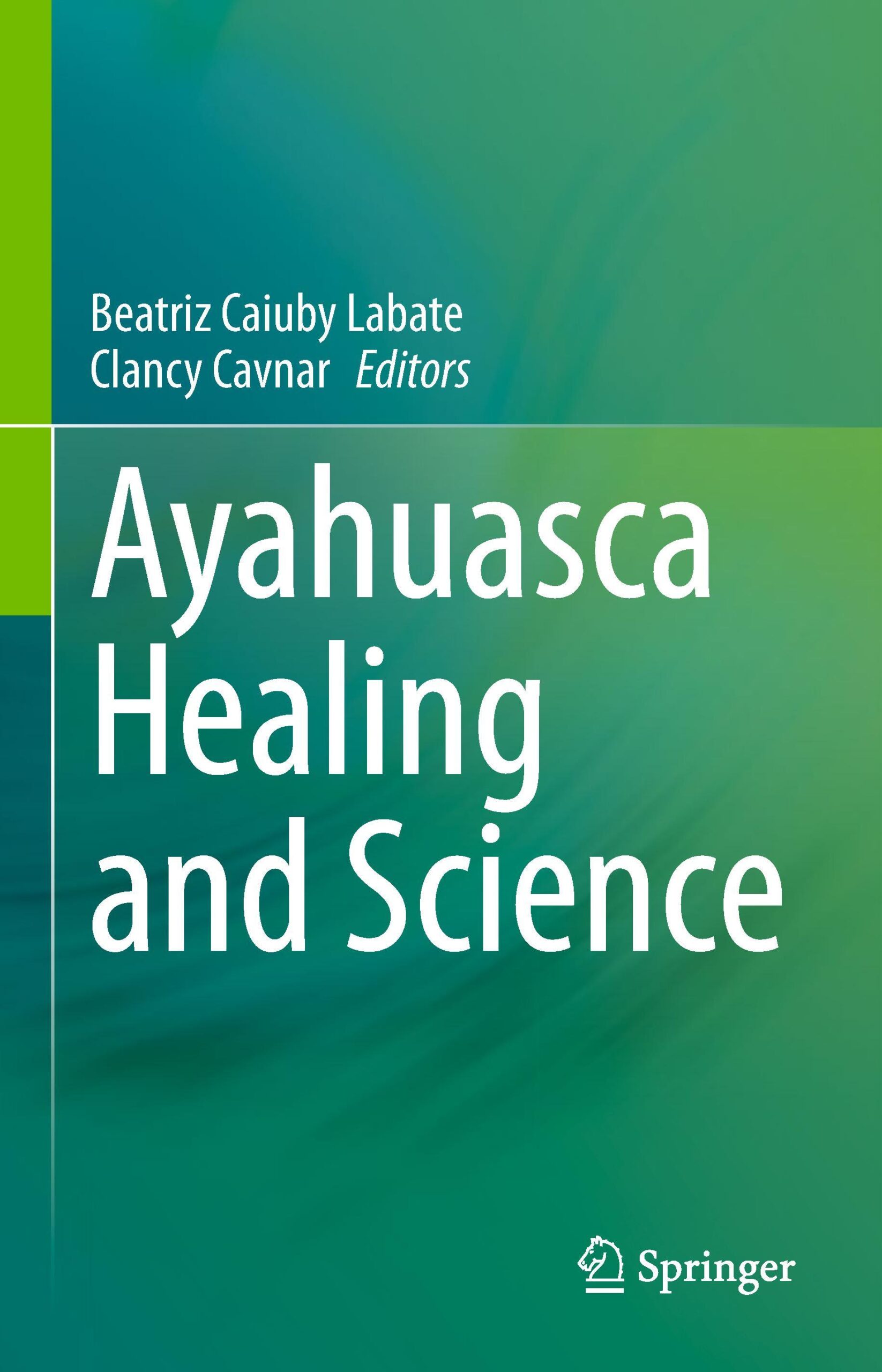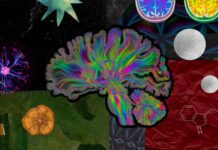- Rethinking Power, Plants, and the Future of Psychedelic Culture - May 9, 2025
- Where Is the Psychedelic Movement Headed Next? - October 15, 2024
- The FDA’s Rejection on MDMA-Assisted Therapy: What is Next for the Psychedelic Movement? - August 16, 2024
- Queering Psychedelics: An Introduction - August 7, 2024
- Introduction to Women and Psychedelics - July 26, 2024
- Eight Frequently Asked Questions About Ayahuasca Globalization - February 13, 2024
Co-edited by Beatriz Caiuby Labate and Clancy Cavnar
To buy at Springer click here
Abstract:
This book offers a series of perspectives on the therapeutic potential of the ritual and clinical use of the Amazonian hallucinogenic brew ayahuasca in the treatment and management of various disorders. Biomedical and anthropological data on the use of ayahuasca for treating depression, PTSD, anxiety, substance dependence, eating disorders, and its role in psychological well-being, quality of life, enhancing cognition, and for coping with grief are presented and critiqued. The use of ayahuasca associated with psychotherapy is examined, alongside the challenges of integrating plant medicines into psychiatry. Further, some preliminary research with animals is introduced in which neural progenitor cells indicate that the alkaloids present in ayahuasca facilitate the formation of new neurons, suggesting that ayahuasca acts at multiple levels of neural complexity. The neurogenic effects of ayahuasca alkaloids open a new avenue of research with potential applications ranging from psychiatric disorders to brain damage and dementia. Chapters combine the review of published literature, personal experiences of the authors with the brew, and first-hand observation of the use of ayahuasca in different contexts. This book is especially timely as the growing scientific evidence of the safety and therapeutic potential of psychedelics such as MDMA and psilocybin increases the likelihood of their rescheduling and adoption into new treatment models.
Editor’s Biographies:

Dr. Beatriz Caiuby Labate (Bia Labate) is a queer Brazilian anthropologist based in San Francisco. She has a Ph.D. in social anthropology from the State University of Campinas (UNICAMP), Brazil. Her main areas of interest are the study of plant medicines, drug policy, shamanism, ritual, religion and social justice. She is Executive Director of the Chacruna Institute for Psychedelic Plant Medicines (https://chacruna.net, https://chacruna-la.org). She is Public Education and Culture Specialist at the Multidisciplinary Association for Psychedelic Studies (MAPS), and Adjunct Faculty at the East-West Psychology Program at the California Institute of Integral Studies (CIIS). She is also co-founder of the Interdisciplinary Group for Psychoactive Studies (NEIP) in Brazil. She is author, co-author, and co-editor of twenty-two books, two special-edition journals, and several peer-reviewed articles.

Clancy Cavnar has a doctorate in clinical psychology (Psy.D.) from John F. Kennedy University in Pleasant Hill, CA. She currently works in private practice in San Francisco, and is Co-Founder and a member of the Board of Directors of the Chacruna Institute for Psychedelic Plant Medicines. She is also a research associate of the Interdisciplinary Group for Psychoactive Studies (NEIP). She combines an eclectic array of interests and activities as clinical psychologist, artist, and researcher. She has a master of fine arts in painting from the San Francisco Art Institute, a master’s in counseling from San Francisco State University, and she completed the Certificate in Psychedelic-Assisted Therapy program at the California Institute of Integral Studies (CIIS). She is author and co-author of articles in several peer-reviewed journals and co-editor, with Beatriz Caiuby Labate, of ten books. For more information see: http://www.drclancycavnar.com
Table of contents
Preface
Ayahuasca Healing and Science
Clancy Cavnar and Beatriz Labate
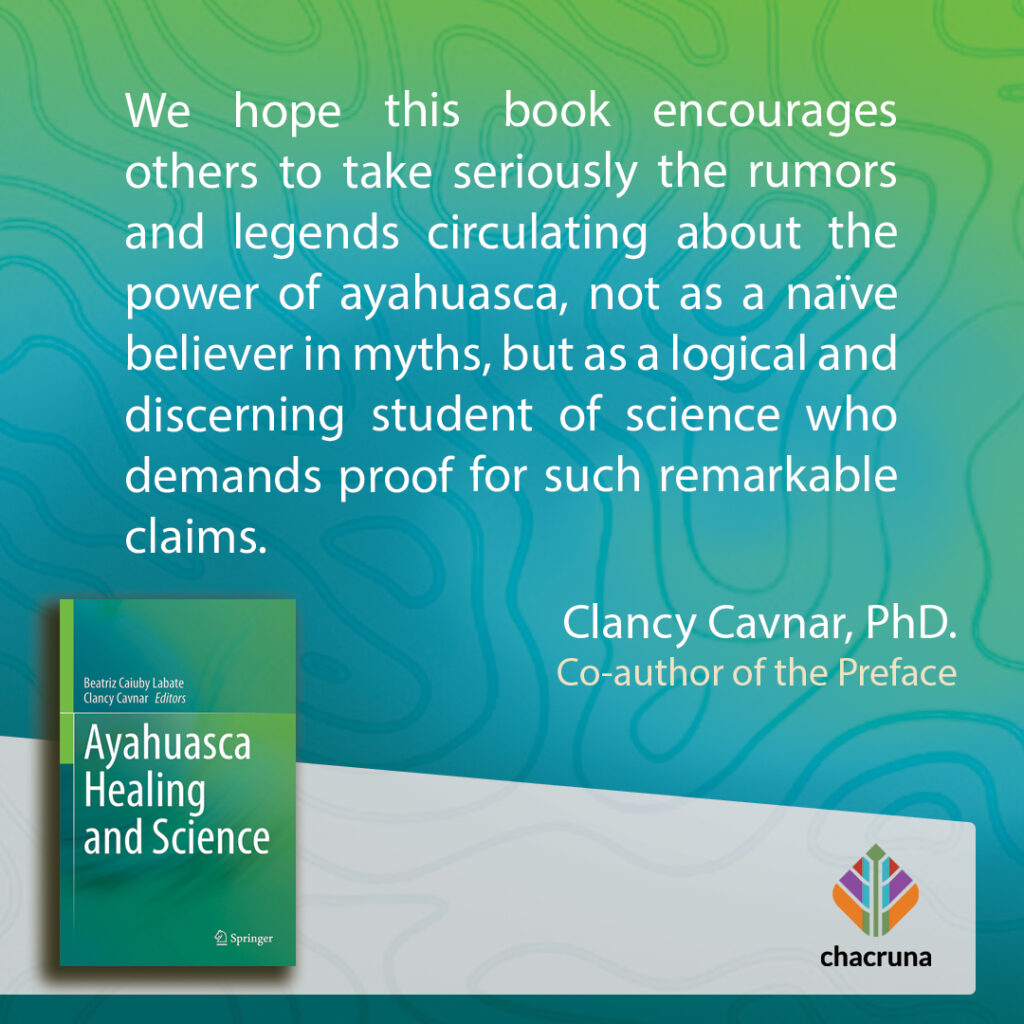
Foreword
Will the Queen Save Us?
Sidarta Ribeiro
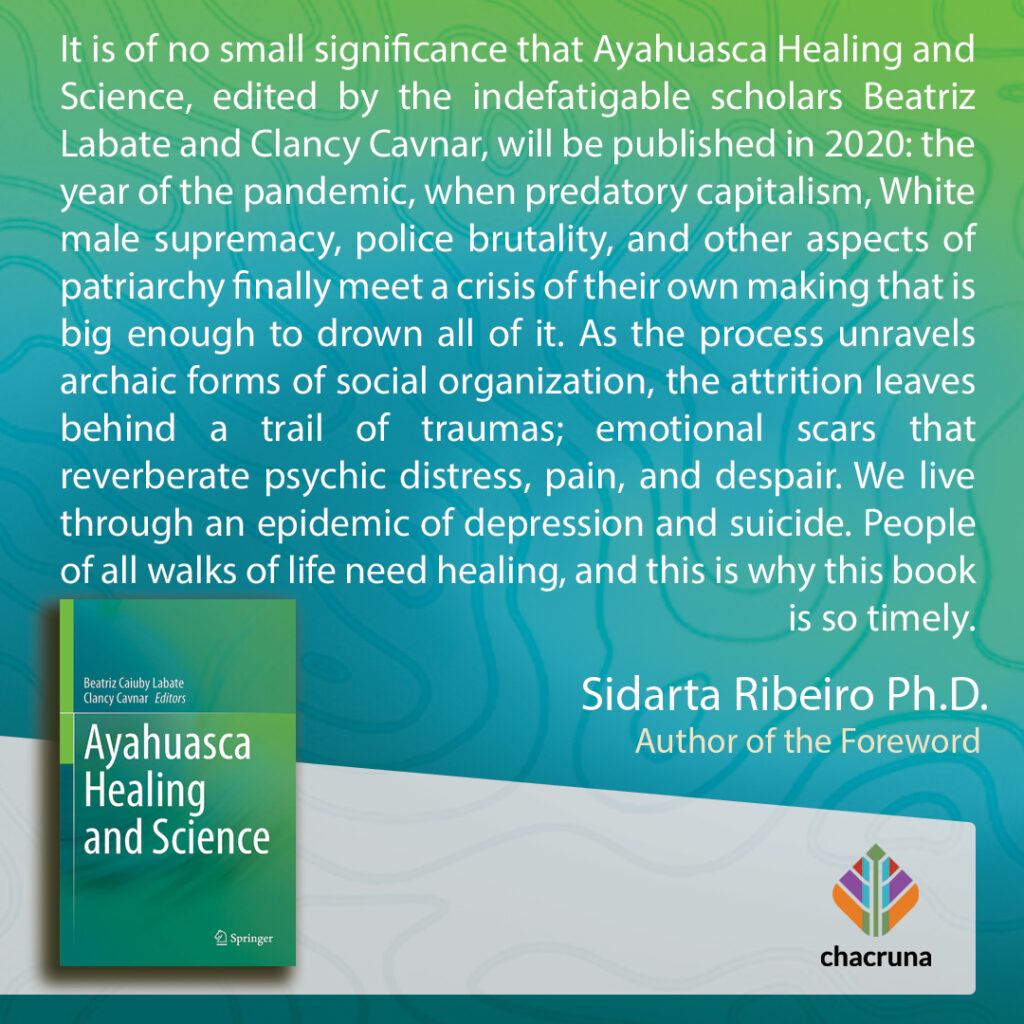
1. Ayahuasca as a Versatile Therapeutic Agent: From Molecules to Metacognition and Back
Marta Valle, Elisabeth Domínguez-Clavé, Matilde Elices, Juan Carlos Pascual, Joaquim Soler, José A. Morales-García, Ana Pérez-Castillo, and Jordi Riba
In this chapter, we review the latest research on the neuroscience and therapeutic potential of ayahuasca. Currently, the type of research available ranges from in vitro experiments to clinical studies performed to assess the modulation of neural and psychological processes. We also discuss the most recently reported findings, including (a) the neurobiological effects of ayahuasca, (b) the psychological mechanisms underlying the potential therapeutic effects of ayahuasca, (c) ayahuasca-induced metabolic and connectivity changes, and (d) the possible link with mindfulness-related capacities and emotion regulation. We also examine the effects of ayahuasca at the cellular level to better explore the role of β-carbolines and the neurogenetic properties of these alkaloids. These important findings indicate that these compounds, which still play a minor role in the overall pharmacology of ayahuasca, merit greater attention. Our aim is to show the remarkable versatility of ayahuasca as a therapeutic agent. Ayahuasca interacts with the brain–mind complex on multiple levels, and could be a powerful tool to help patients with neuropsychiatric disorders who are unable to find relief through currently available treatments.
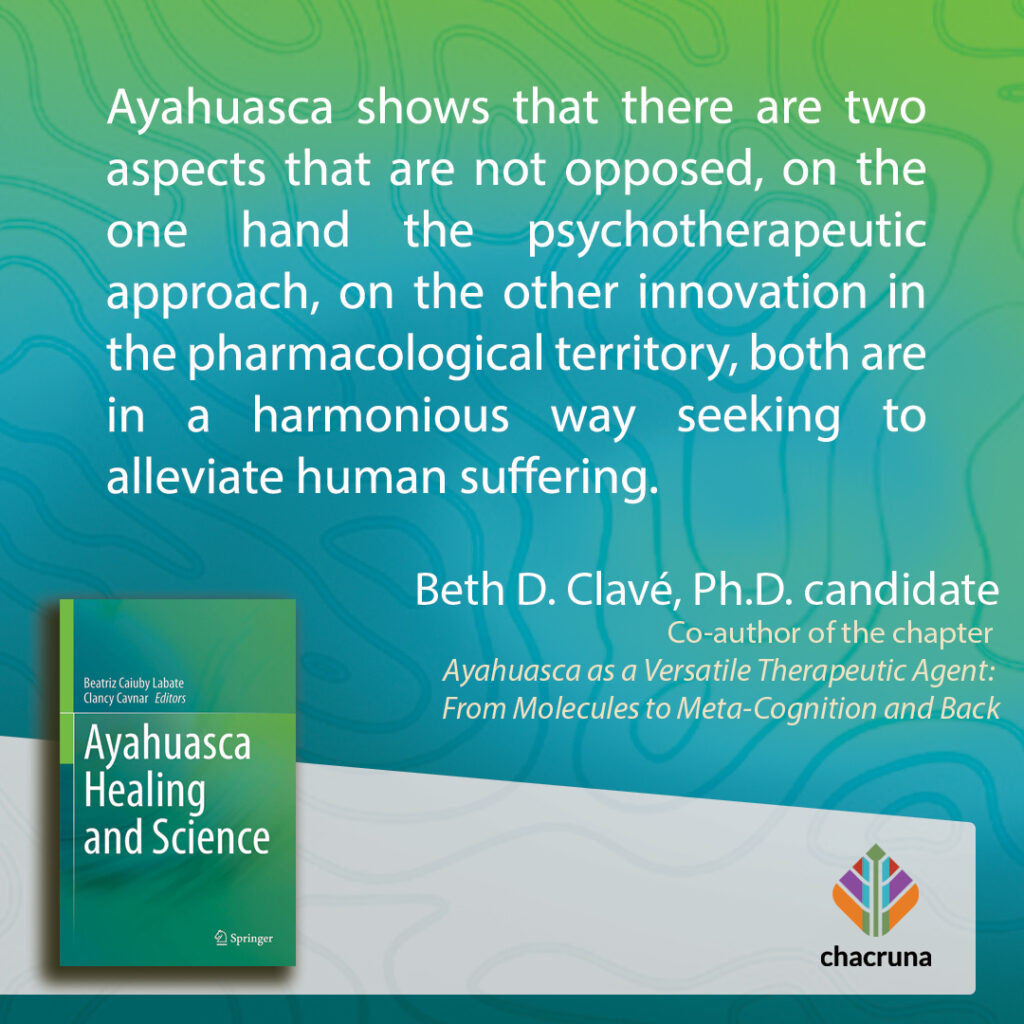
2. Recent Evidence on the Antidepressant Effects of Ayahuasca
Fernanda Palhano-Fontes, Sérgio Mota-Rolim, Bruno Lobão-Soares, Nicole Galvão-Coelho, Joao Paulo Maia-Oliveira, Dráulio B. Araújo
Depression is a mood disorder with profound negative effects on the individual’s quality of life and augmented suicidal risks. Despite substantial progress in the development of new antidepressants that have been made in the last decades, remission rates are modest, around 50% after the first treatment. Besides, antidepressants usually take about 2 weeks for the effects to take place. In the search for alternative treatments for depression, serotonergic psychedelics, such as ayahuasca, are emerging with promising results. Recent clinical trials have suggested a potential antidepressant effect of ayahuasca. In a first open-label trial, 17 patients with depression took part in a single ayahuasca session conducted in a hospital, and depressive symptoms were monitored by clinical scales to assess depression severity at 1, 2, 7, 14, and 21 days after the session. Depressive symptoms improved significantly already 1 day after the session, an improvement that persisted for 21 days. In a follow-up randomized placebo-controlled trial, 29 patients with treatment-resistant depression participated in a single session in a hospital, half took one dose of ayahuasca, and the other half with a placebo substance that, similar to ayahuasca, produced some gastrointestinal distress. We observed significant antidepressant effects of ayahuasca already 1 day after the session with ayahuasca, which was even more pronounced 7 days later. In addition to the antidepressant effects, we explored potential biological processes that might be related to the antidepressant effects observed. These included biochemical markers, functional magnetic resonance imaging (fMRI), and sleep electroencephalography (EEG). This chapter aims to review some general aspects of depression, discuss the motivations to use ayahuasca as a novel antidepressant, and present the latest scientific findings that should help clarify the mechanisms behind the observed antidepressant effect of ayahuasca.
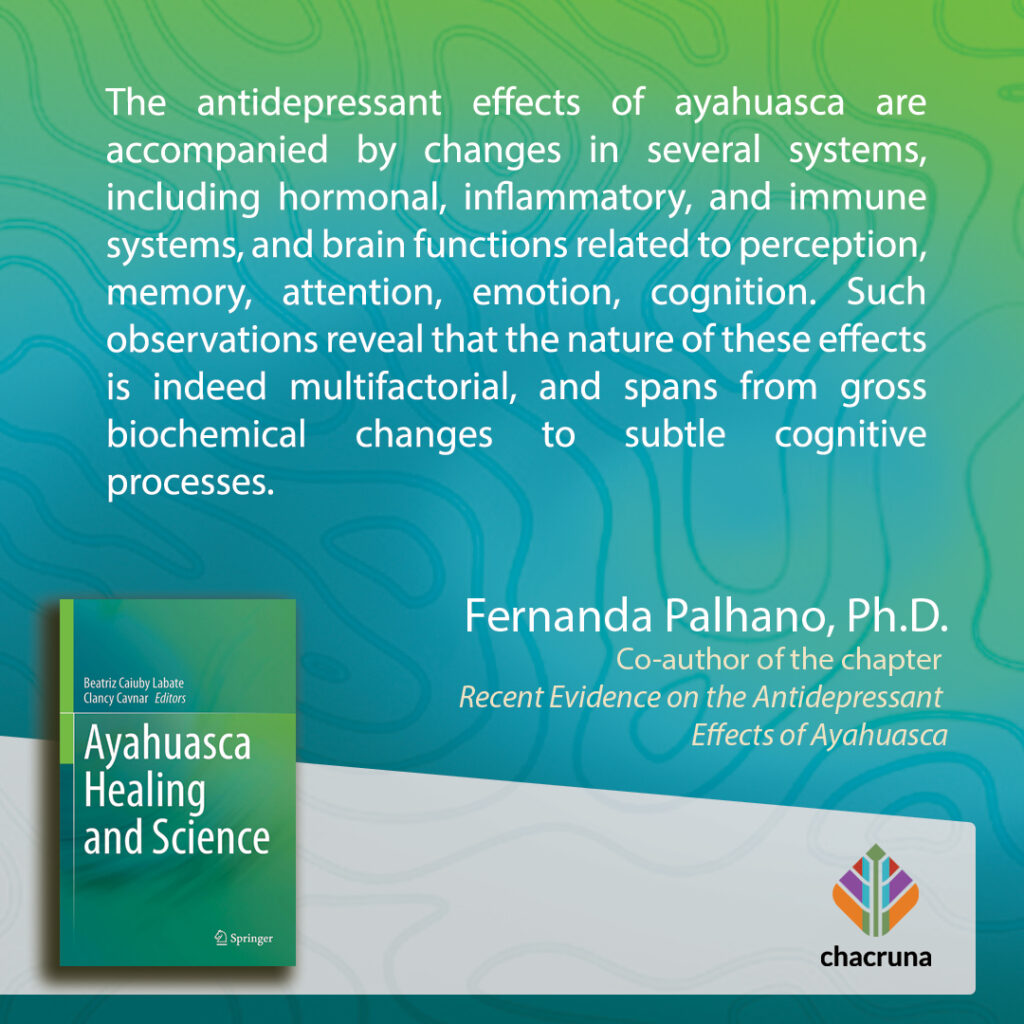
3. Psychedelic Medicines: A Paradigm Shift from Pharmacological Substitution Towards Transformation-Based Psychiatry
Milan Scheidegger
While psychoactive drugs such as ketamine and psilocybin have been researched extensively in the past decades, scientific interest in ayahuasca has just started to grow, due to its potential therapeutic benefits. Beyond its traditional indigenous and mestizo use in the Amazon, ayahuasca is currently spreading all over the world as an alternative plant medicine in various ritualistic contexts. This rapid dissemination coincides with the observational evidence that ayahuasca facilitates transformational processes with beneficial health outcomes. However, more empirical research is needed to move beyond anecdotal evidence and further verify therapeutic efficacy and biomechanisms of ayahuasca under controlled conditions. The objective of this chapter is to outline future possibilities of ayahuasca-assisted therapies based on the biomedical literature on psychedelics and other contexts in which ayahuasca is used to support health and wellbeing. First, psychedelic medicines will be contrasted with standard psychopharmaceuticals as a novel treatment option that necessitates a paradigm shift from substitution- to transformation-based therapy. Second, various adaptogenic effects of ayahuasca will be reviewed, including effects on body, brain, and mental functioning. Third, a novel transformational psychotherapy framework will be introduced that outlines how ayahuasca could be used to support sustainable transformation. Finally, future research directions of developing pharmahuasca applications in clinical settings will be contrasted with traditional and indigenous contexts of ayahuasca use, highlighting the challenges of intercultural knowledge transfer.
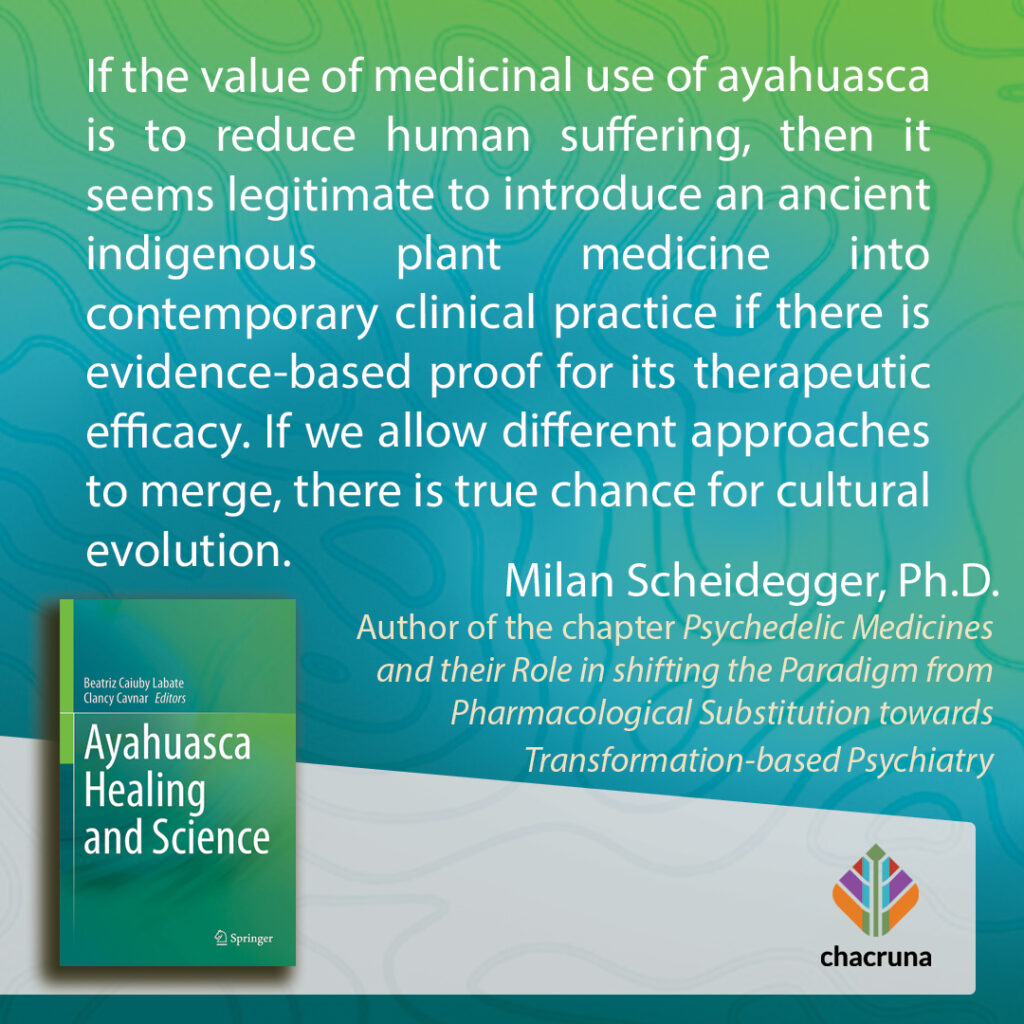
4. Ayahuasca and Psychotherapy: Beyond Integration
Mauricio Diament, Bruno Ramos Gomes, Luis Fernando Tófoli
With the internationalization of ayahuasca and reports of its positive effects on mental health, the interest in its therapeutic potential is increasing. Additionally, the different uses of ayahuasca may elicit wide-ranging psychological and emotional experiences. Therefore, the therapeutic use of ayahuasca can—and should—be appreciated from a psychotherapeutic point of view. This approach follows, but only to a certain extent, the already established paradigm of psychedelic-assisted psychotherapy. The effects of ayahuasca include bodily, emotional, and experiential changes to the experience of self and world, both during its acute effect and in the days after, and several of them may be related to its psychotherapeutic effect. In this chapter, the association of ayahuasca and psychotherapy will be discussed through the review of existent literature, the authors’ professional experience, and remarks about possible new paths in this field. Some points discussed here include: the role of the experience for the individual, suffering and challenging experiences with the brew, ayahuasca visions, the generation of content to be used in psychotherapy, the mediation of a “plant third party,” integration processes, and the encounter of ayahuasca with well-established psychotherapeutic schools.
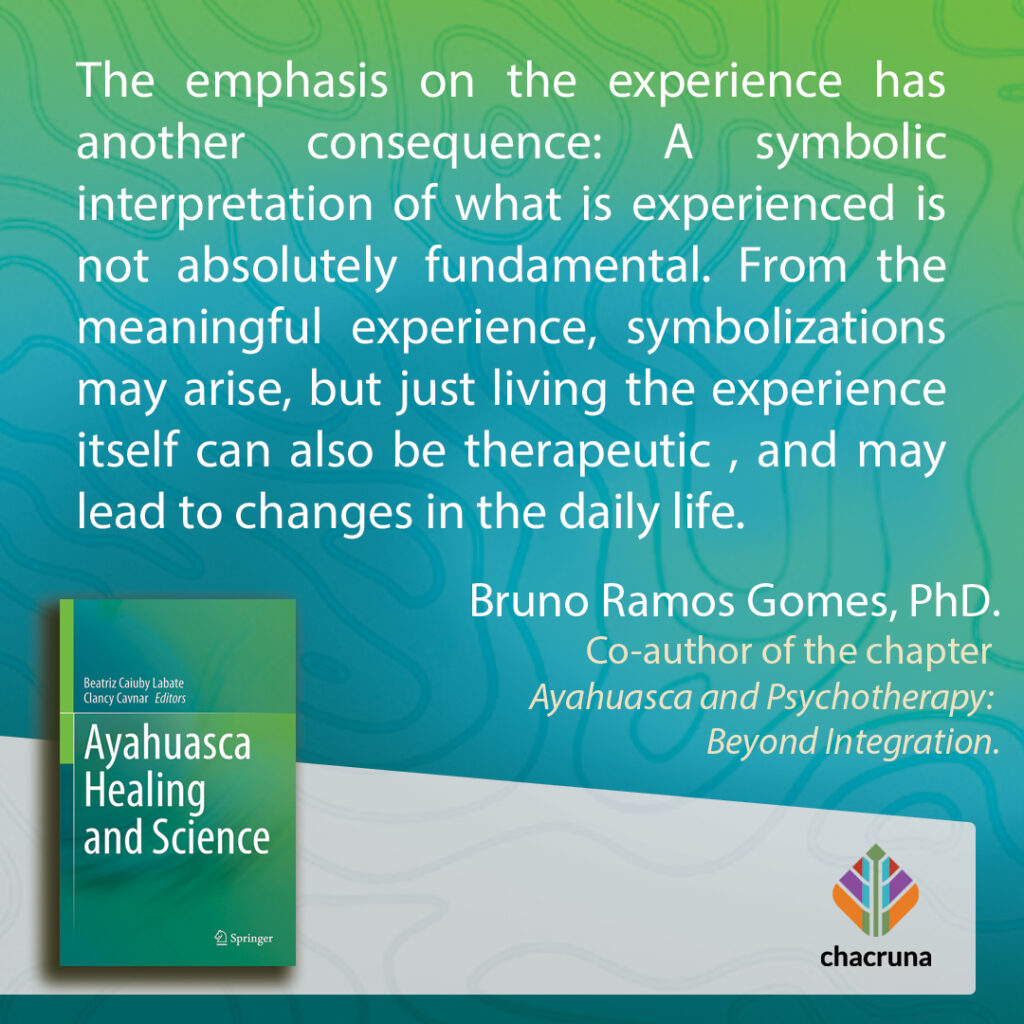
5. A Qualitative Assessment of Risks and Benefits of Ayahuasca for Trauma Survivors
Jessica L. Nielson, Julie D. Megler, Clancy Cavnar
The use of ayahuasca for healing trauma and resolving associated symptoms has gained increasing attention recently. As a result, a surge of trauma survivors has converged on healing centers around the world in pursuit of ayahuasca therapy. Although research into ayahuasca has suggested it is safe and holds great therapeutic potential for mental health disorders, the potential for harm has been highlighted in recent years, particularly around set and setting with inexperienced facilitators and centers exploiting this rapidly growing market. The current study reports on data from a retrospective cross-sectional online survey of ayahuasca users either with or without a self-reported history of post-traumatic stress disorder (PTSD). Data reported here capture the potential risks of ayahuasca use in people with a history of PTSD and how they compare to the reported benefits. Results suggest that while most people find ayahuasca to be helpful (79–97%) and not dangerous (67–76%), people with a history of PTSD were 10% more likely to disclose information about dangerous experiences associated with taking ayahuasca, compared to those with no reported history of PTSD. Qualitative assessments of open-ended responses regarding dangerous experiences included feelings that the facilitators were inexperienced, not having sufficient physical and psychological support, inadequate facilities for purging, overcrowding in ceremonies, lack of follow-up care, and insufficient screening of participants with psychotic disorders who became violent. While most people found the experience to be helpful and healing, people are reporting unfavorable responses to ayahuasca, particularly those with a history of PTSD. Further investigation is necessary to develop best practices that ensure safety for participants with PTSD when seeking ayahuasca therapy.
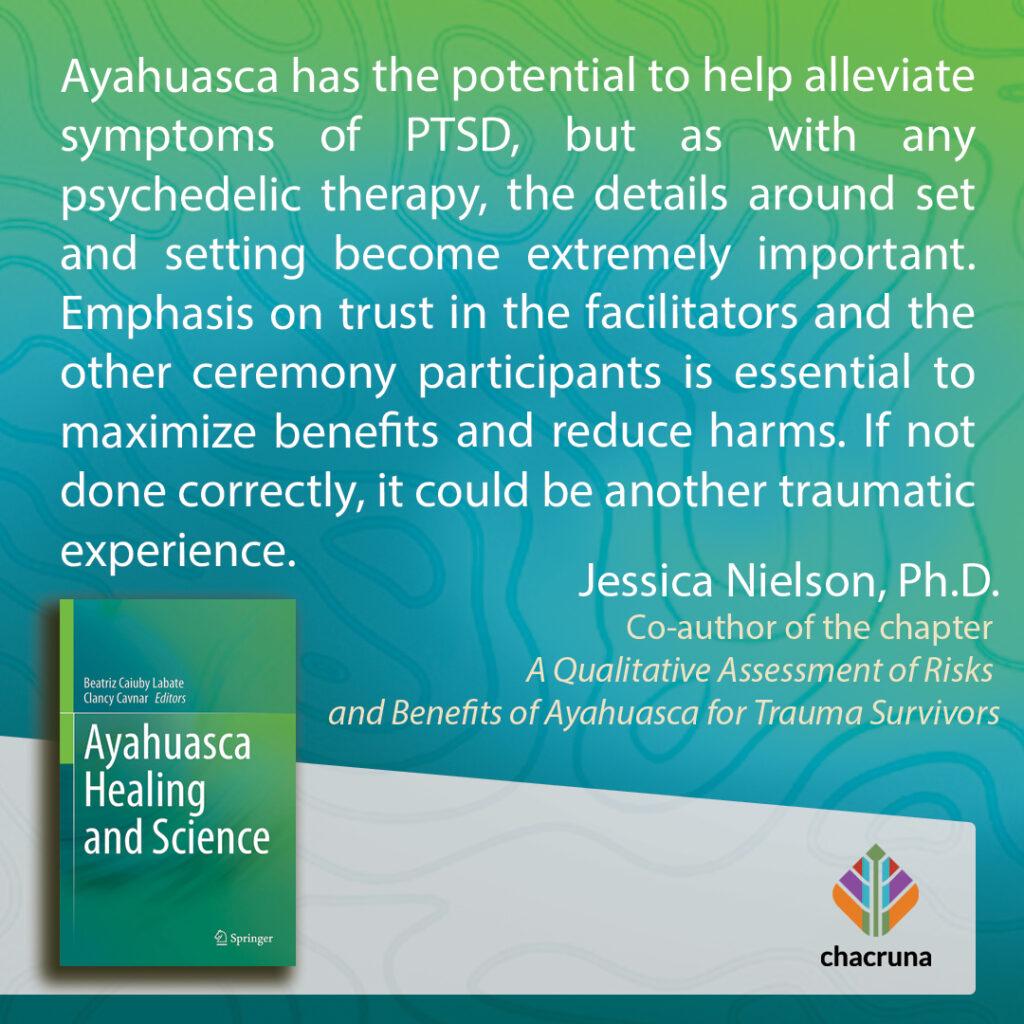
6. Ayahuasca and Childhood Trauma: Potential Therapeutic Applications
Daniel Perkins, Jerome Sarris
There is increasing evidence that ayahuasca may have therapeutic efficacy in the treatment of mood, anxiety, and substance use disorders. Another potential area of application relates to individuals who have experienced childhood adverse experiences. Exposure to such traumatic stressors during childhood has been associated with later life mental and physical health conditions, health risk behaviors, and alcohol and substance use disorders, as well as broader negative effects on well-being and life satisfaction. Moreover, the number of traumatic childhood exposures is strongly correlated with the level of increased risk and overall symptom complexity. Such early trauma is associated with vast individual and societal costs and particularly challenging to treat due to a pervasive and multifaceted symptomology. There have been various notions advanced regarding the therapeutic processes associated with ayahuasca consumption that could be relevant for work in this area. These include the potential to revisit and reconceptualize adverse childhood events; possible therapeutic effects relating to depression, anxiety, and substance use disorders; potential neurobiological and physiological benefits; as well as enhanced self-awareness and broader well-being. This chapter reviews the core aspects, presentation, and impacts of childhood trauma in later life. It then outlines potential areas in which ayahuasca may support the treatment of such individuals, drawing on existing evidence and early responses from a global study of ayahuasca drinkers.
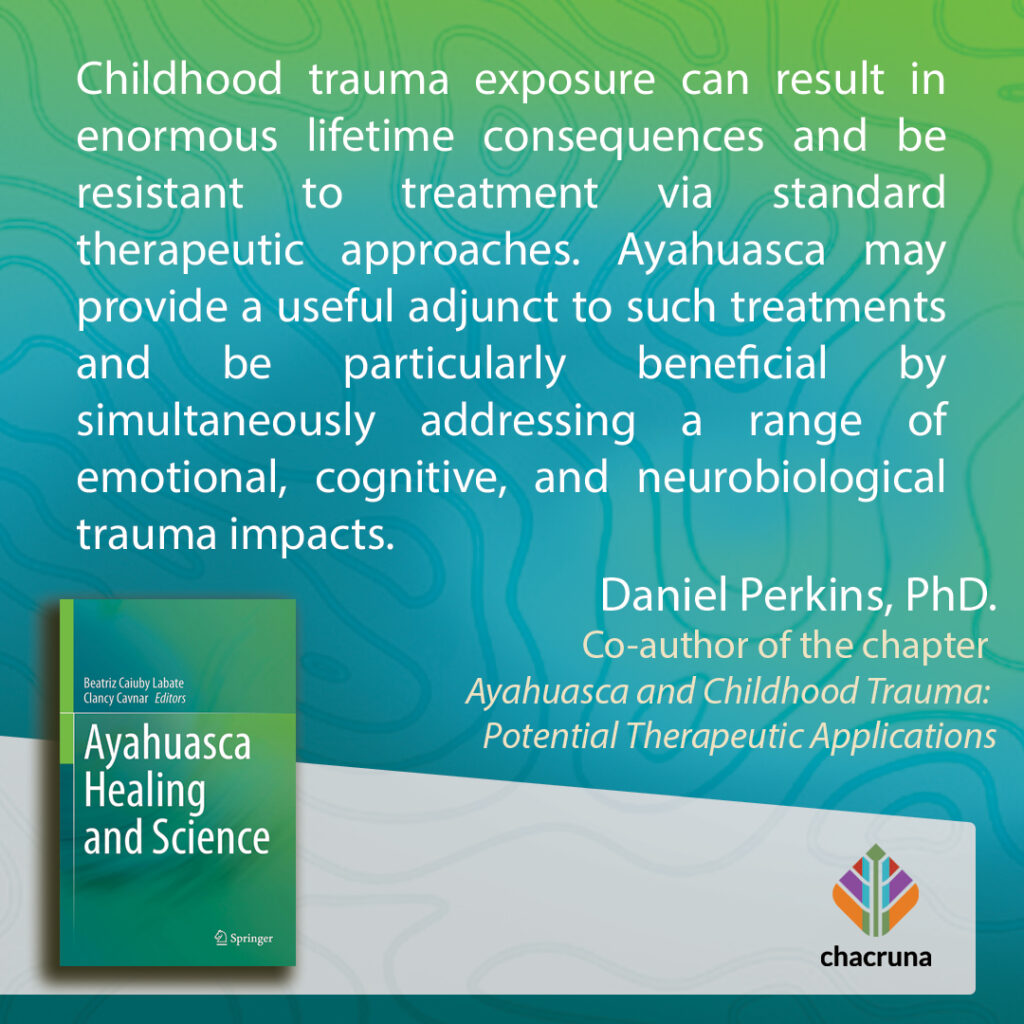
7. Acute and Long-Term Effects of Ayahuasca on (Higher-Order) Cognitive Processes
Natasha L. Mason, Kim P. C. Kuypers
There is increasing evidence of the potential therapeutic value of the psychedelic brew ayahuasca for disorders like depression, PTSD, and anxiety. While the focus has been on ayahuasca’s capacity to reduce symptoms of these disorders, including enhancing mood state and well-being, little attention has been paid to the (higher-order) cognitive processes that may be enhanced or that may play a role in this. Examples of such processes include flexible (creative) thinking, empathy, and emotion regulation, which are crucial for everyday interactions and cooperation, and have been found to be decreased in certain pathological populations. The aim of the present chapter is to review the acute and long-term effects of ayahuasca on (higher-order) cognitive processes, such as flexible (creative) thinking, empathy, and emotion regulation, and look for the link between these cognitive effects and subjective mood state and well-being.
Findings show that, although objective evidence is limited due to a scarcity of studies, previous studies with ayahuasca and similar psychedelics, like psilocybin and LSD, support the notion that ayahuasca can enhance previously mentioned higher-order cognitive processes. Importantly, evidence is given to suggest that this enhancement outlasts the acute stage, thus potentially persisting over time. Unfortunately, no study assessed the relationship between these cognitive effects and mood and well-being.
It is concluded that, while these findings partially explain why ayahuasca has therapeutic utility in the treatment of certain psychopathologies, future clinical research into the therapeutic effects of ayahuasca could assess the relationship between the effect on (higher-order) cognitive and emotional processes and mood and well-being and test the role both play in symptom alleviation in the pathological population in the short and longer term.
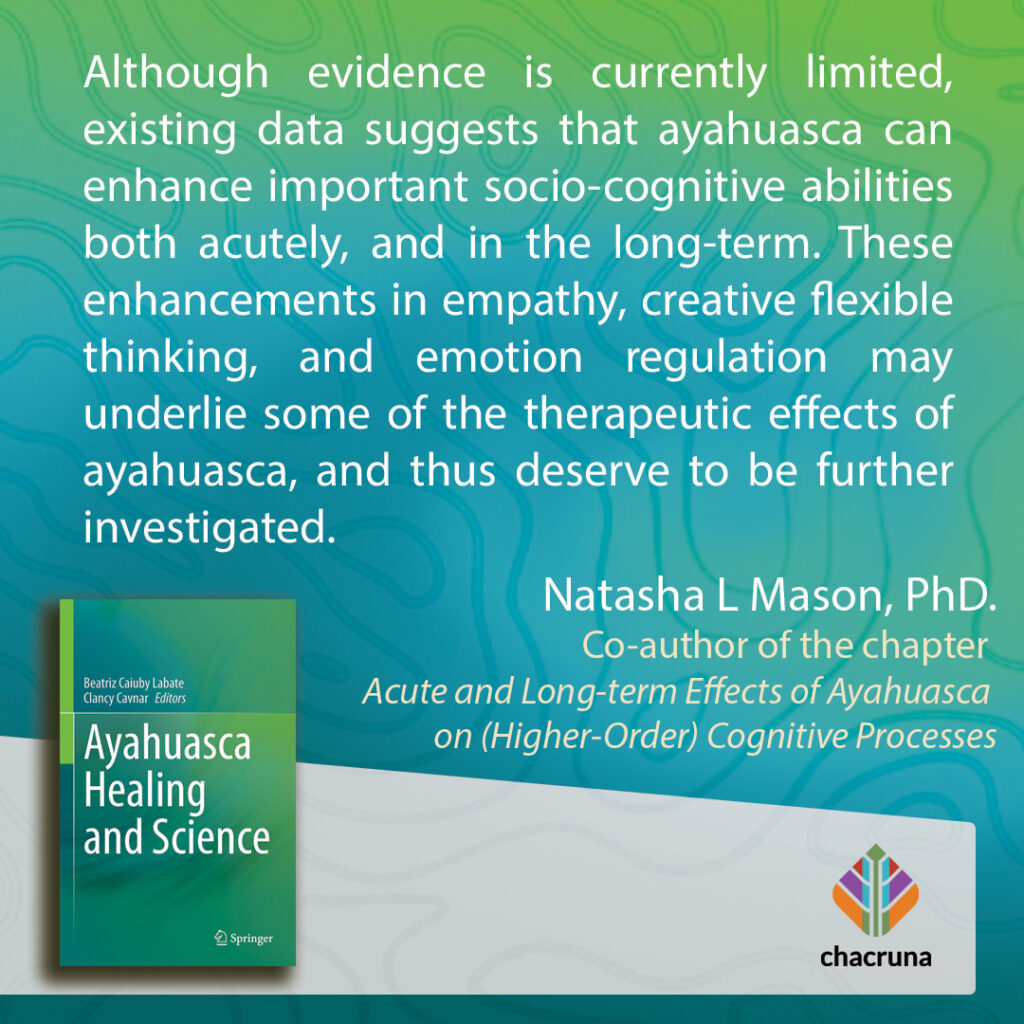
8. Healing with the Brew: Ayahuasca’s Reconfiguration of “Addiction”
Piera Talin
This chapter provides an ethnographically grounded, qualitative analysis of the experiences of people recovering from substance dependence among Italian and Brazilian chapters of the Santo Daime church and among Brazilian spiritualist communities that make ceremonial use of ayahuasca. It suggests that substances such as ayahuasca are very peculiar pharmacological tools whose value needs to be made sense of within specific ecologies of use and care that are not yet easily comprehensible within the biomedical paradigm. The goal is to reveal how the pharmacology of ayahuasca, its rich semiotic worlds, and the thick relational fabric within which it is used, together, produce a uniquely potent and deeply caring, situated efficacy. The healing presented here emerges out of a loose assemblage of empirical, case-by-case assessments within structured networks of support. This gives the ritual space an iterative and reflexive dimension, thereby enabling a form of care that is attentive to the specificity of different situations and contexts. The chapter concludes with reflections on the conceptual challenges biomedical studies of ayahuasca face in making sense of the complex, dynamic, and amplified efficacy of psychedelic-assisted interventions within an epistemology that presumes a radical distinction between the “pharmaceutical” and the “social.” Within such an epistemology, it becomes difficult to account for the specific, situated, and contextual efficacy that healers witness and patients experience. Supporting such a dynamic of care and making it legible within current evidentiary norms—which are standardized according to universal norms—presents a considerable challenge.
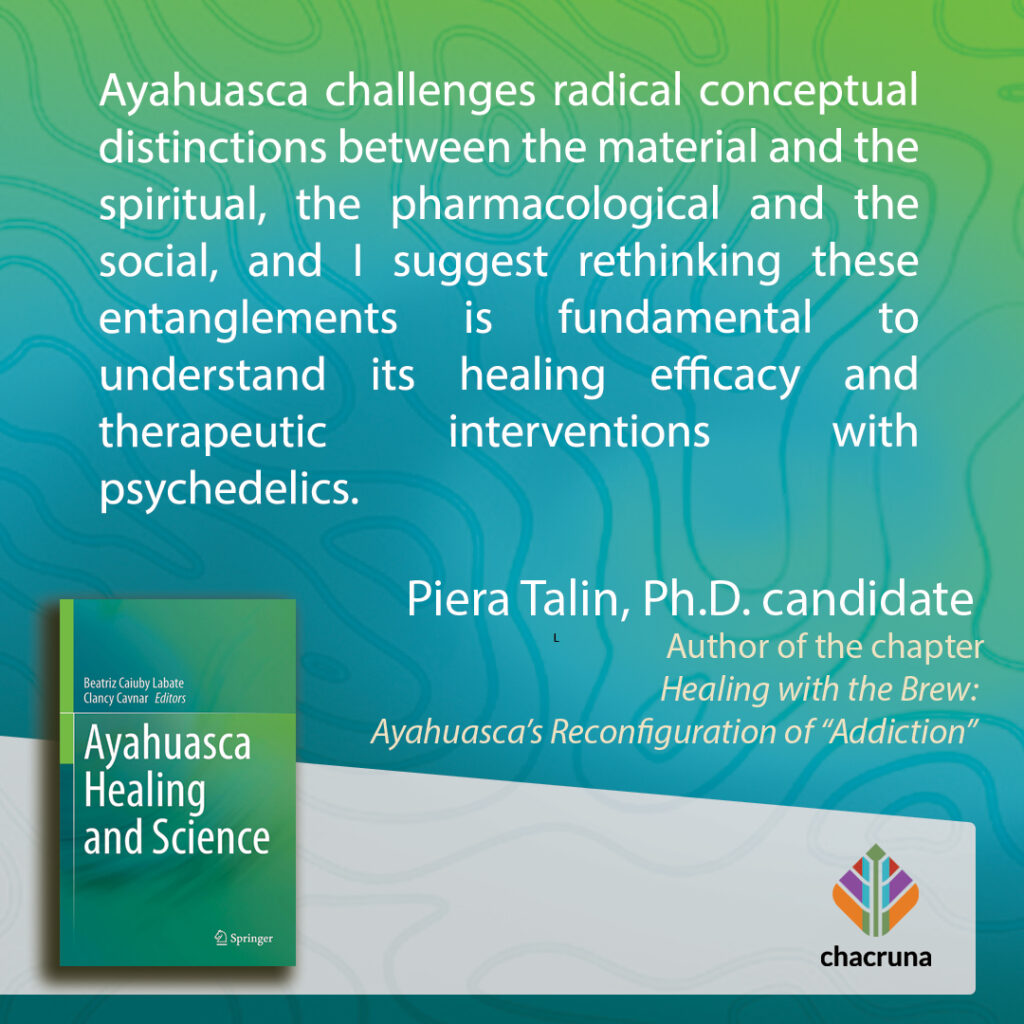
9. Ayahuasca as an Addiction Treatment in Catalonia: Cognitive and Cultural Perspectives
Ismael Apud
Ayahuasca arrived in Spain at the end of the 1980s through different alternative therapy centers, spiritual groups, and Brazilian churches. Since then, Spanish people have been connecting through informal psychospiritual networks, interested in using ayahuasca to cope with various psychological and medical problems. One of these is addiction. This chapter is the summary of research conducted in Catalonia and surrounding areas in Spain, focused on addicts recovered through the ritualistic use of ayahuasca. First, I will make a brief presentation of the studies related to ayahuasca and its potential therapeutic effect, including addiction treatment. Next, a ritual healing model that combines cultural and cognitive levels will be proposed, using insights from medical anthropology, cognitive science of religion, neuropsychology, and other interdisciplinary fields. The model emphasizes how the ritual can produce different “memories of the experience,” triggering new biographical narratives and diverse psychological effects. After this, I will make a description of the research methods: a qualitative study of 12 cases and a biographical analysis of their subjective narratives. The study is not an assessment of the efficacy of the treatment but a qualitative analysis that tries to uncover the cognitive and cultural mechanisms that allow ritual healing to achieve its therapeutic goals. Explaining those cases with both cognitive and cultural approaches will help us to see ritual healing in all its complexity, producing a variety of medical and psychological outcomes.
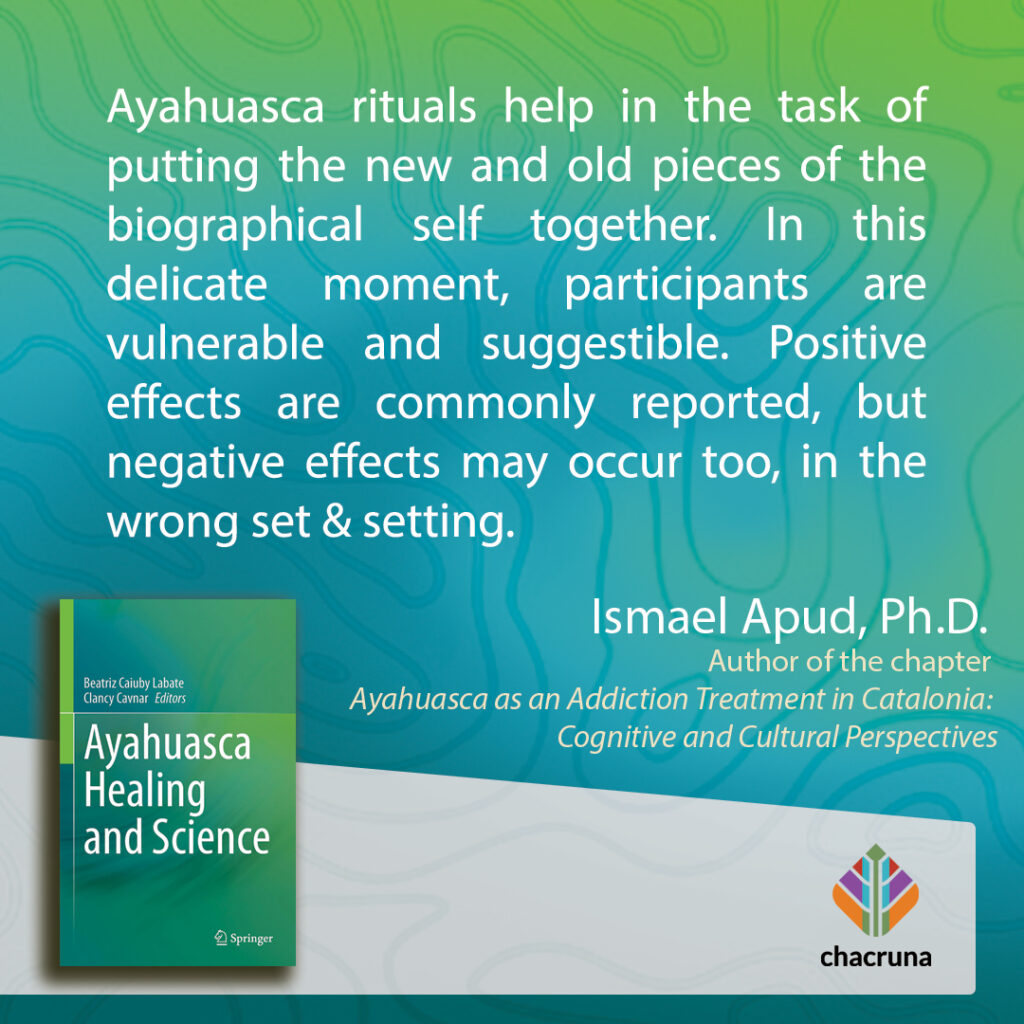
10. Perspectives on Healing and Recovery from Addiction with Ayahuasca-Based Therapy Among Members of an Indigenous Community in Canada
Elena Argento, Rielle Capler, Gerald Thomas, Philippe Lucas, Kenneth W. Tupper
Indigenous populations in Canada and globally experience a disproportionate burden of social and health-related risks and harms due to multigenerational impacts of colonialism, racialized policies, and related trauma. Associated outcomes include elevated rates of mental health and substance use disorders and devastating disconnection from traditions, culture, language, and spirituality. Despite decades of ongoing research and intervention efforts, conventional addiction treatment approaches continue to have only limited success among such vulnerable populations. This chapter elucidates the lived experiences of participants of a research project assessing the impact of ayahuasca-based therapy on addiction and other substance use-related outcomes among members of a rural Indigenous community in Western Canada. Quantitative findings demonstrated that ayahuasca therapy delivered in a ritualized retreat setting led to statistically significant reductions in problematic cocaine use, with some participants reporting complete cessation of drug use at follow-up. Increased connectedness with self, others, nature, and spirit was described as a key element associated with reduced cravings and substance use. This study highlights the therapeutic potential of ayahuasca-based therapy to facilitate deep and sustained healing and recovery from addiction for members of an Indigenous community, including some who had experienced highly traumatic histories and several failed treatment attempts. Given the heterogeneity of Indigenous populations, and distinct vulnerabilities associated with living in rural and remote settings, this study supports calls to advance research tailored to the needs of marginalized populations. Further research should explore how ayahuasca and other psychedelics affect connectedness and other factors that may improve well-being and facilitate recovery from addiction.
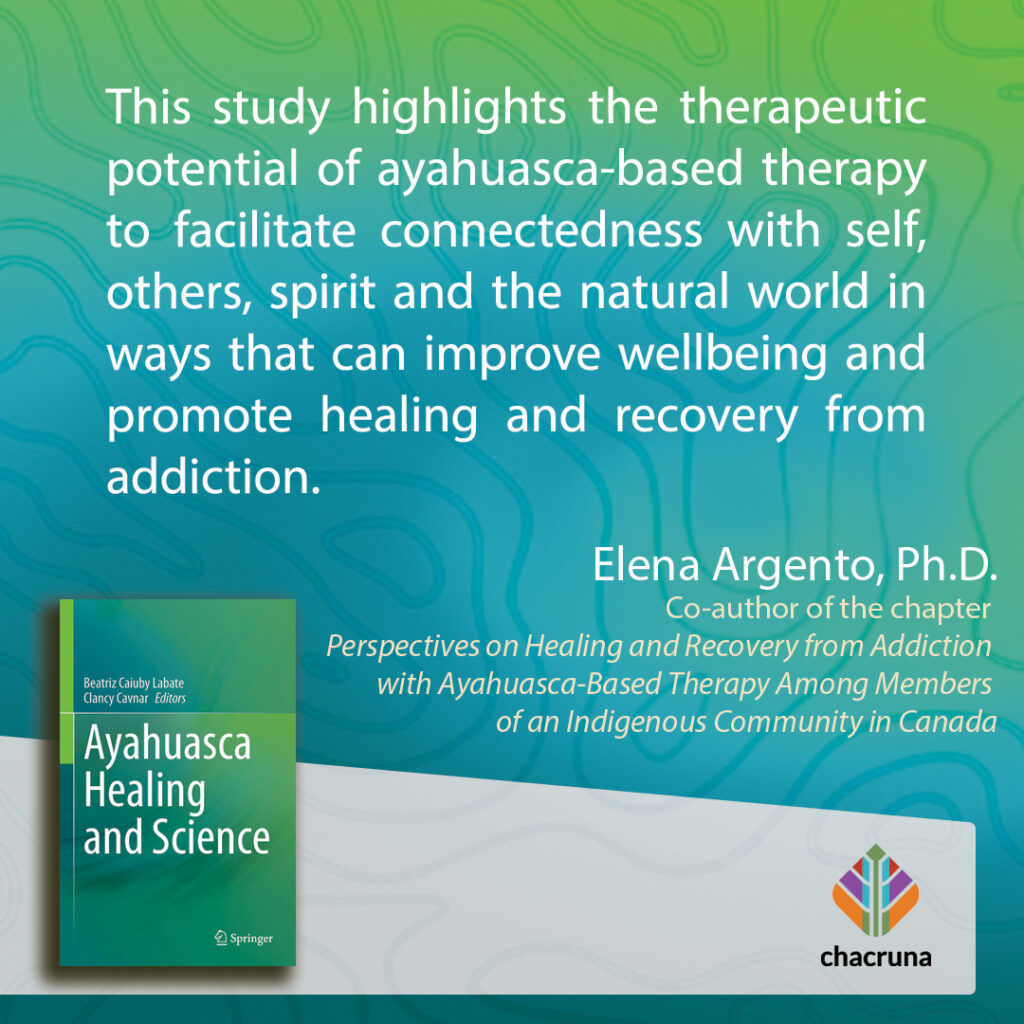
11. Ayahuasca as a Healing Tool Along the Continuum of Recovery from Eating Disorders
Adele Lafrance, Marika Renelli, Jenna Fletcher, Natasha Files, Kenneth W. Tupper, Anja Loizaga-Velder
Eating disorders (EDs) are associated with a wide array of comorbid psychological symptoms and conditions. They can have a serious impact on quality of life, as well as contributing to high morbidity and premature mortality. EDs are also among the most challenging mental disorders to treat, and long-term outcome studies show high rates of relapse. For these reasons, new treatments must be explored. This chapter will explore the potential for ayahuasca as a healing tool for EDs via qualitative study of the experiences of participants with both a history of an ED and ceremonial ayahuasca use in various contexts. Positive outcomes will be presented through a biopsychosocial-spiritual lens, as will data from a subset of participants who also engaged in conventional ED treatment in North America. Perceived risks associated with ayahuasca-assisted therapy and recommendations for the integration of ayahuasca in a Western context will also be presented.
12. The Therapeutic Use of Ayahuasca in Grief
Débora González, Adam Andros Aronovich, María Carvalho
This chapter is part of a broader study that aims to prospectively assess the long-term effects of ayahuasca on bereavement. The qualitative reports shown here are from participants who attended workshops at the Temple of the Way of Light while processing grief over the death of a loved one. Several themes emerged: emotional processing, making meaning of the past, reconstructing identities, continuing bonds with the deceased, and finding existential meaning. These psychological processes have been described as mediators in grief adaptation in scientific literature. Adding to this evidence, we also explored the perspectives of four Shipibo onaya healers. This way, we understood that the observed therapeutic effects of ayahuasca cannot be described solely in terms of psychological and intrapersonal dimensions, since they are embedded in a particular ceremonial and ethnomedical context, with many experiences being reported in relation to the participant’s perception of the role of the work of the Shipibo healers and the icaros.
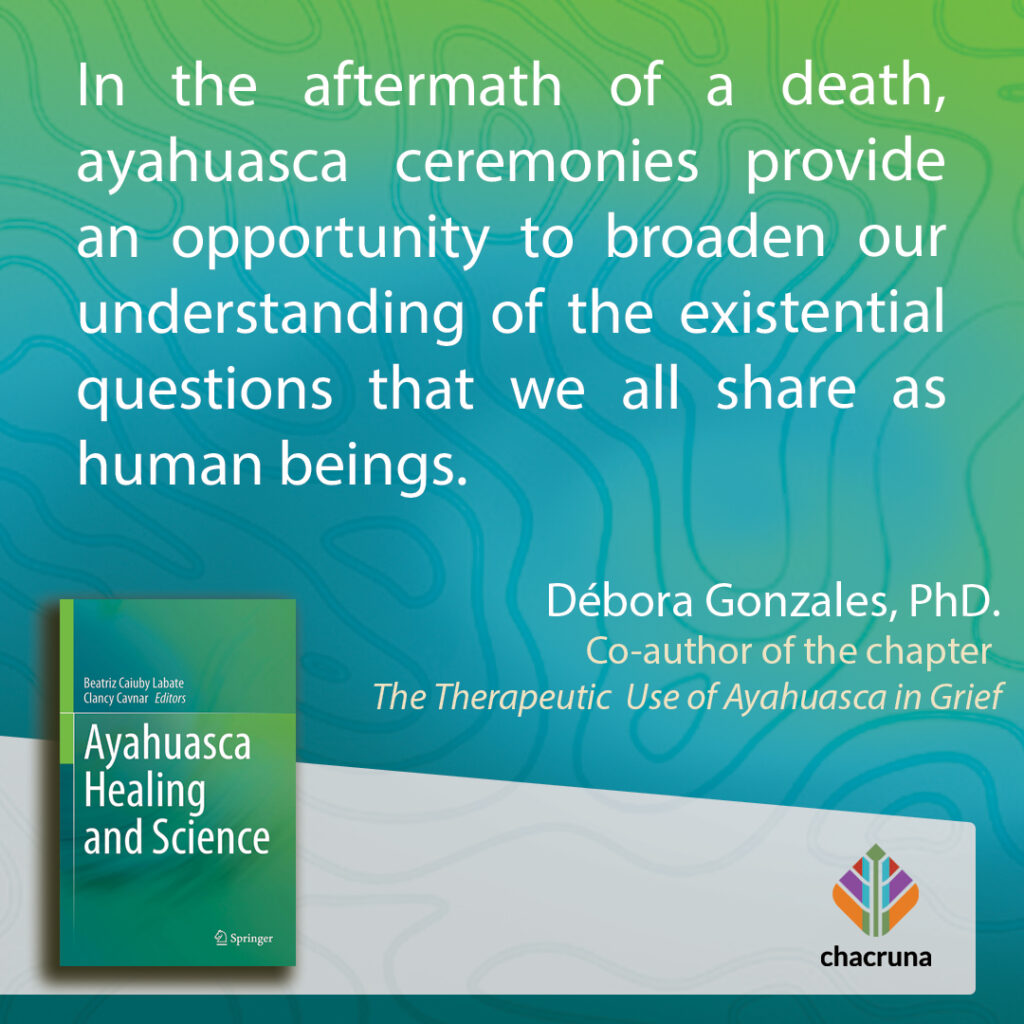
13. Healing at the Intersections between Tradition and Innovation: An Interview with Shipibo Onaya Jorge Ochavano Vasquez
Adam Andros Aronovich, Beatriz Caiuby Labate
Jorge Ochavano Vasquez, also known as Soi, is a Shipibo onaya (“one who knows”: a healer who works with oni, meaning wisdom or knowledge, the Shipibo name for ayahuasca) from the Ucayali River Basin in the Peruvian Amazon. Heir to a long line of Shipibo onayabo, he was initiated into this medical system while growing up in a region of rainforest undergoing rapid globalization and urbanization. Soi belongs to a generation of young Shipibo healers whose practice has been heavily informed and influenced by the increasing interest, attention, and presence of Western ayahuasca seekers. Working regularly in retreat centers that cater to Western clients (including the Temple of the Way of Light as well as his own family center in the native community of Nueva Betania). In this interview, we explore Soi’s perception of illness and well-being as it emerges from the encounter between two worldviews and their related medical systems. Amazonian diagnostic categories such as “daño,” “susto,” or “cupia”—some of the most common complaints among indigenous or mestizo Amazonians—imply a degree of external agency and are usually attributed to sorcery, magic, or disharmonious relationships with the plant, animal, or spirit realms. Yet, the majority of Westerners seeking ayahuasca usually complain of depression, anxiety, posttraumatic symptoms, and a variety of other self-reported experiences that, whether as diagnostic constructs or subjective narratives of affliction, are mostly prevalent in industrialized and individualistic societies. In this interview, we offer the perspective of a young healer, who dialogues with both indigenous etiologies and Western diagnostic constructs, working on the frontline of the controversies surrounding the tension between tradition and innovation, and who has lived experience of the paradoxical nature of “development” in a rapidly Westernizing world.
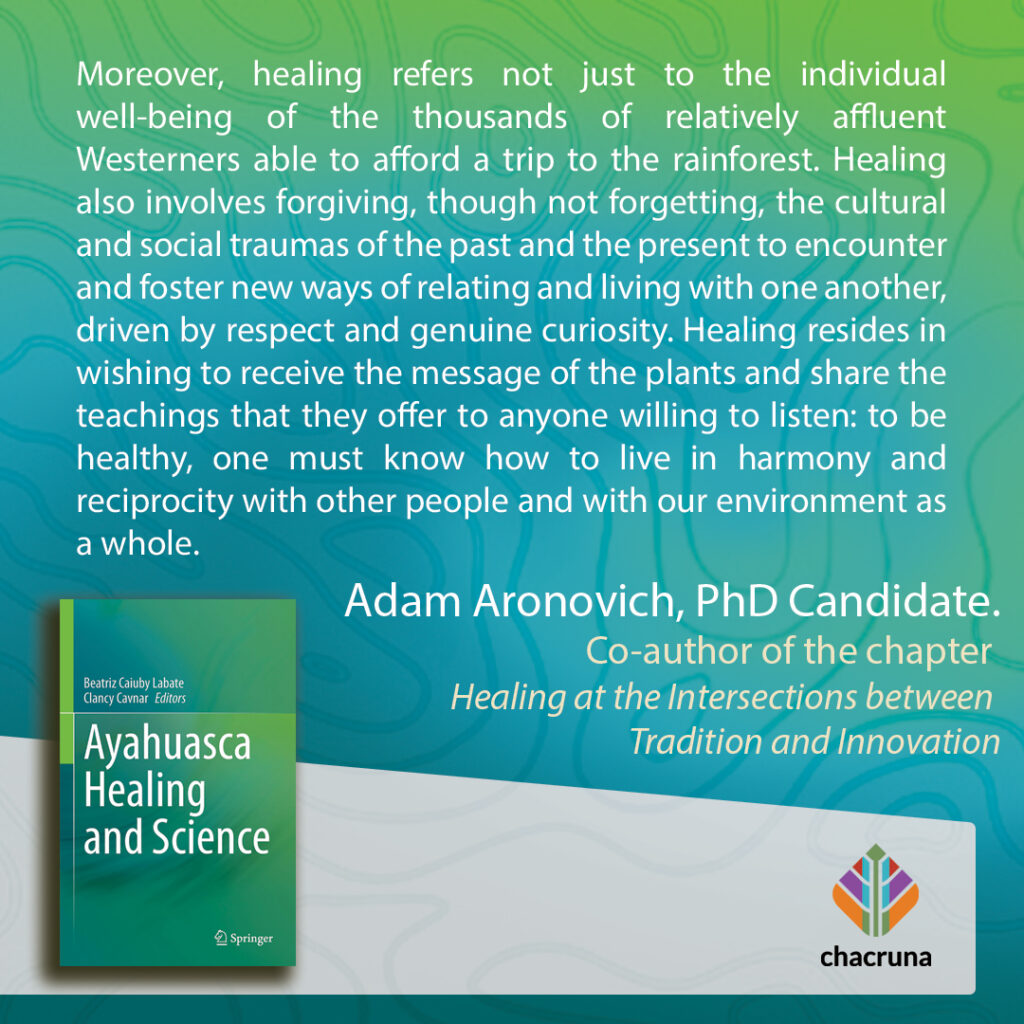
Author Biographies
1.
Marta Valle, Pharmacist with PhD in Pharmacology from the University of the Basque Country, works as Scientific Director in the Clinical Pharmacology, Modeling and Simulation group of Parexel International. Previously, she has been Head of the Pharmacokinetic / Pharmacodynamic Modeling and Simulation Group at the Research Institut of Hospital de la Santa Creu i Sant Pau, where she collaborated closely in numerous clinical studies of human neuropsychopharmacology, with special interest in drugs of abuse such as ayahuasca. cannabis or salvinorin A. For almost 10 years she was associate professor in the department of pharmacology, therapeutics and toxicology at the Autonomous University of Barcelona and Coordinator of the Pharmacology PhD Program at the same university.
Elisabet Domínguez-Clavé holds a bachelor’s degree in psychology, and master’s degrees in both psychiatry and clinical research. She is a Ph.D. candidate at the Department of Pharmacology and Therapeutics of the Autonomous University of Barcelona (UAB), Spain. She is currently carrying out research on the therapeutic applications of ayahuasca under the supervision of Dr. Jordi Riba, head of the Human Neuropsychopharmacology Research Group at Sant Pau Hospital in Barcelona. She also collaborates with the Psychiatry Department at the same hospital, under the supervision of Dr. Joaquim Soler and Dr. Juan Carlos Pascual.
Matilde Elices is a psychologist with a Ph.D. in psychiatry from the Autonomous University of Barcelona (UAB), Spain. She is interested in determining the psychological mechanisms that underlie the therapeutic effects of ayahuasca and its potential therapeutic utility for the treatment of severe mental disorders. She currently works at the Mental Health Research Group at the Institute Mar of Medical Research (Spain) and collaborates with the psychiatry department at Sant Pau Hospital. Matilde has co-authored more than 20 peer-reviewed articles, most of them focused on the efficacy of psychological treatments.
Jose A. Morales-García is a Spanish neuroscientist who currently works for the Spanish Research Network on Neurodegenerative Diseases (CIBERNED) in Madrid. He was awarded his Ph.D., summa cum laude, with a special doctorate mention, in neuroscience by the Autonomous University of Madrid. He is a specialist in identification and analysis of new cellular targets implicated in neurogenesis and neurodegeneration. His scientific training in different national and international universities was focused in the study in vitro and in vivo of the mechanisms underlying neurodegenerative disease, mainly Alzheimer’s and Parkinsonism, in order to develop new neuroprotective, anti-inflammatory and neurogenic compounds for the treatment of these disorders. Together with scientific research on neurodegenerative diseases, Jose A. holds a position as Associate Professor at the Medical School in Complutense University of Madrid and as Professor in the master in neuropharmacology program at the medical school in the Autonomous University of Madrid.
Juan Carlos Pascual is a psychiatrist that works at Sant Pau Hospital in Barcelona. He is affiliated with the Borderline Personality Disorder Unit of the psychiatry department. He is also Associate Professor in the Department of Psychiatry and Forensic Medicine at the Autonomous University of Barcelona. He is also a researcher in the Spanish Research Network on Mental Health (CIBESAM). He has published more than 70 peer-reviewed papers related to borderline personality disorder (BPD). He has collaborated and led several financed projects on BPD targeting, genetics, neuroimaging, and pharmacological treatments.
Joaquim Soler is a senior clinical psychologist working in the Borderline Personality Disorder Unit of the Psychiatry Department of Sant Pau Hospital in Barcelona. He is also Associate Professor in the Department of Psychiatry and Forensic Medicine at the Autonomous University of Barcelona. He has been trained as a DBT and MBCT therapist. He has collaborated and led several publicly-funded projects on borderline personality disorders (BPD), dealing with patient assessment, genetics, and the implementation of psychological and pharmacological treatments. He has published more than 60 peer-reviewed papers on BPD, depression, and mindfulness. Dr. Soler is also a researcher in the Center of Research in Mental Heath Network. He is also a principal investigator of the Mindfulness Group in the Excellence Network for the Dissemination of Psychological Treatments for Mental Health Promotion in Spain. He has collaborated with the National Health Department and with international and national scientific societies. Currently, he is the president of the Spanish DBT Society.
Ana Perez-Castillo received her Ph.D. in the field of biochemistry from the Complutense University of Madrid. Afterwards, she was awarded Fulbright and Fogarty postdoctoral fellowships to work at the Department of Medicine of the University of Minnesota. She is currently serving as a research professor at the Spanish Research Council (CSIC). She also belongs to the Spanish Research Network on Neurodegenerative Diseases (CIBERNED), an Institution encompassed in the International Network of Centers of Excellence in Neurodegeneration. Her work has centered on molecular biology approaches to study pathologies of the central nervous system, specifically Parkinson’s and Alzheimer’s diseases. Prof Perez-Castillo and her coworkers have identified several genes involved in these neurodegenerative disorders. She is also an expert in the field of neurogenesis. She has authored more than 150 papers, many in several of the most recognized peer-reviewed journals. She has made relevant contributions to the identification of novel therapeutic targets and treatment strategies for neurodegenerative disorders.
Jordi Riba holds a Ph.D. in pharmacology. He leads the Human Neuropsychopharmacology Research Group at Sant Pau Hospital in Barcelona, and is a member of the Spanish Research Network on Mental Health (CIBESAM). He has a broad interest in psychoactive drugs, with publications on psychedelics, psychostimulants, cannabinoids, and kappa receptor agonists. He has been studying ayahuasca for over 15 years and has published nearly 40 journal articles and book chapters on the subject. He has also supervised three doctoral dissertations on the acute and long-term effects and therapeutic potential of ayahuasca in humans. He has also collaborated on the first clinical studies involving ayahuasca administration to patients with depression. His current research deals with the post-acute psychedelic “after-glow” and the use of ayahuasca in the treatment of various psychiatric conditions. He is also investigating the neuroprotective and neurogenic potential of ayahuasca alkaloids. Initial data obtained from studies in animals have revealed that several active principles present in the tea protect brain cells from hypoxia and stimulate the birth of new neurons in adult mice. These stunning results open a whole new avenue of research for ayahuasca. Potential applications of its active principles range from depression, to neurodegenerative disorders, to neural deficits associated with hypoxia and trauma.
2.
Fernanda Palhano is an electrical engineer with double degrees: one from the Federal University of Rio Grande do Norte (UFRN) and another from the École National Supérieure d’Electrotechnique, d’Electronique, d’Informatique (ENSEEIHT), Toulouse, France. She earned a master’s and a Ph.D. in neurosciences from the Brain Institute of UFRN. In the master’s program, she used functional magnetic resonance imaging (fMRI) to evaluate the acute effect of ayahuasca. In her doctoral thesis, she investigated the therapeutic potential of ayahuasca in patients with treatment-resistant depression. Her main areas of interest are psychedelics, psychiatry, and imaging techniques such as fMRI and electroencephalography.
Sergio A. Mota-Rolim received his medical degree from the Federal University of Rio Grande do Norte (UFRN) (1998–2004), with research experience in sleep, memory, and anxiety. He earned an MSc in neuroscience at the Federal University of São Paulo (2005–2007), studying the influence of biological rhythms on sleep and memory. He received a Ph.D. in neuroscience from UFRN (2008–2012), researching the epidemiological and neurophysiological aspects of lucid dreaming. In his current position as postdoctoral researcher (2013–2017) at the Brain Institute, and the Onofre Lopes University Hospital (UFRN), he is working with sleep, dreams, lucid dreaming, the neurobiological basis of music perception, and the use of DMT for the treatment of depression.
Bruno Lobão Soares is a veterinary doctor, and has received a Ph.D. in neuroscience from the University of São Paulo. At the present, he is an assistant professor at Federal University of Rio Grande do Norte (UFRN). His current research is related to dopaminergic regulation of sleep and memory, and to new neuropharmacological tools in humans and in animal models.
Nicole Leite Galvão Coelho received her Ph.D. in psychobiology from the Federal University of Rio Grande do Norte (UFRN) in 2009, where she became assistant professor at department of physiology. She has been developing research on neuroendocrinology of stress response, and stress-related psychopathologies, and currently coordinates the laboratory of hormonal measures and a primate center at UFRN, which houses around 200 common marmosets (Callithrix jacchus), a species that has been widely used as an animal model in neuroscience studies.
João Paulo Maia de Oliveira graduated with a degree in medicine from the Federal University of Rio Grande do Norte in 2003. He is a psychiatrist, and received his master’s and doctoral degrees in medicine, focusing on mental health, from the University of São Paulo. He is currently an assistant professor of psychiatry at the Federal University of Rio Grande do Norte. His main research interests are schizophrenia, depression, and translational research.
Draulio Barros de Araujo is a professor of neuroimaging at the Brain Institute (UFRN), Natal, Brazil. In recent years, his research has focused on using functional neuroimaging methods (EEG and fMRI) to investigate the acute and lasting effects of ayahuasca. His research group has also been studying the antidepressant potential of ayahuasca.
3.
Milan Scheidegger holds an M.D. degree and completed his Ph.D. in functional and molecular neuroimaging at the Institute for Biomedical Engineering (University and ETH Zurich). As a senior physician and group leader of Psychedelic Research & Therapy Development at the Department of Psychiatry, Psychotherapy, and Psychosomatics at the University Hospital of Psychiatry in Zurich, he is currently researching the neurobiology and pharmacology of psychedelics such as ketamine, psilocybin, ayahuasca, and DMT. He co-founded Reconnect Foundation, a non-profit organization based in Switzerland, with the mission to develop transformative treatments for mental health care. On his ethnobotanical expeditions to Mexico, Colombia, and Brazil he explored the traditional use of psychoactive plants in indigenous rituals. In addition to empirical research, he earned an M.A. degree in history and philosophy of knowledge (ETH Zurich). His main interests include biosemiotics, epistemology and phenomenology of consciousness, mindfulness, and deep ecology.
4.
Mauricio Diament, M.D., is a Brazilian psychiatrist from São Paulo, and a member of Interdisciplinary Cooperation for Ayahuasca Research and Outreach (ICARO) with an interest in psychedelic research on ayahuasca and its clinical implications, as well as on other psychoactive substances.
Bruno Ramos Gomes, M.A., is a psychologist with a master’s degree in public health at São Paulo University with a research project on the use of ayahuasca to help homeless people recover in Brazil. He has been working since 2004 using harm reduction in Cracolandia, a region with hundreds of crack users in the streets of downtown São Paulo. He has been also been working with ibogaine treatment since 2010, and is collaborating on ayahuasca research to treat alcohol dependence at the Interdisciplinary Cooperation for Ayahuasca Research and Outreach (ICARO) at UNICAMP.
Luís Fernando Tófoli, Ph.D., is Professor of Psychiatry at the Faculty of Medical Sciences of the University of Campinas (UNICAMP), Brazil. He heads the Laboratory of Interdisciplinary Studies on Psychoactive Substances and is a member of the State Council on Drug Policies of São Paulo. He is responsible for the Interdisciplinary Cooperation for Ayahuasca Research and Outreach (ICARO) at UNICAMP and has recently published on the field of drug policies and the therapeutic use of psychedelics, especially ayahuasca. He is a member of Chacruna’s Ayahuasca Community Committee.
5.
Jessica L. Nielson is a jointly appointed tenure-track assistant professor in the psychiatry department and the Institute for Health Informatics at the University of Minnesota Twin Cities. Jessica received her Ph.D. from UC Irvine in 2010 in anatomy and neurobiology, and her postdoctoral training in bioinformatics and multivariate statistics at UC San Francisco. Her research involves working with animal and human data repositories for archived and ongoing trials aimed at precision diagnosis and treatment of several neurological disorders, including spinal cord injury (SCI), traumatic brain injury (TBI), post-traumatic stress disorder (PTSD), and schizophrenia. Jessica is also currently gathering preliminary data through an anonymous online survey to assess user-reported risks and benefits of ayahuasca therapy across various contexts, specifically related to the treatment of PTSD, depression, and substance abuse.
Julie D. Megler is a board-certified nurse practitioner in psychiatry and family medicine. She received her master of science in nursing from the University of Miami, Florida, and post- master’s certificate in psychiatry at the University of California San Francisco. She is co-founder of Sage Integrative Health, a mental health and wellness clinic that incorporates allopathic and holistic care as well as ketamine assisted therapy. Her clinical practice focuses on integrative mental health for emotional and physical well being, and integration of non-ordinary states of consciousness. In addition to her clinical work, Julie is on the board of directors for ERIE (Entheogenic Research, Integration, and Education) non-profit. She has presented on the topics of psychedelic risk reduction, integration, and therapeutic applications of ayahuasca at different conferences and has also co-authored chapters in the books Manifesting Minds and The Therapeutic Use of Ayahuasca. As an experienced clinician and activist for the psychedelic movement, Julie is dedicated to educating the community about safety and the therapeutic benefits of entheogens.
Clancy Cavnar has a doctorate in clinical psychology (Psy.D.) from John F. Kennedy University in Pleasant Hill, CA. She currently works in private practice in San Francisco, and is Associate Editor at Chacruna (https://chacruna.net), a venue for publication of high-quality academic short texts on plant medicines. She is also a research associate of the Interdisciplinary Group for Psychoactive Studies (NEIP). She combines an eclectic array of interests and activities as clinical psychologist, artist, and researcher. She has a master of fine arts in painting from the San Francisco Art Institute, a master’s in counseling from San Francisco State University, and she completed the Certificate in Psychedelic-Assisted Therapy program at the California Institute of Integral Studies. She is author and co-author of articles in several peer-reviewed journals and co-editor, with Beatriz Caiuby Labate, of eight books. For more information see: http://neip.info/pesquisadore/clancy-cavnar
6.
Daniel Perkins is a Research Fellow in the School of Social and Political Science at the University of Melbourne and co-founder of the university’s Medicinal Psychedelics Research Network. He is currently leading a number of cross-sectional and longitudinal studies examining the use and mental health and wellbeing effects of the Amazonian psychoactive tea ayahuasca, in collaboration with researchers from Australia, Brazil, Spain, Switzerland, and the Czech Republic. This includes the largest global study of ayahuasca drinking with over 7000 respondents in 50 countries. Daniel is also Director of the Office of Medicinal Cannabis in the Victorian Department of Health and Human Services, and a registered psychotherapist and neurofeedback practitioner.
Jerome Sarris is an NHMRC Clinical Research Fellow and Professor of Integrative Mental Health at NICM Health Research Institute at Westmead, Western Sydney University. He also holds an honorary Principal Research Fellow appointment at Melbourne University, Department of Psychiatry. He has a particular interest in mood and anxiety disorder research pertaining to lifestyle medicine and nutraceutical psychopharmacology, and psychotropic plant medicine research (in particular on Kava, medicinal cannabis, and psychedelics). Professor Sarris has over 180 academic publications, including journal articles featured in The American Journal of Psychiatry, Lancet Psychiatry, JAMA Psychiatry, and World Psychiatry). He has conducted many RCTs in the field, including 3 recent multicentre NHMRC Project Grants as CIA. Professor Sarris was a founding Vice Chair of The International Network of Integrative Mental Health & is an Executive Committee Member of the International Society for Nutritional Psychiatric Research. He currently leads the LIFEMend Neuropsychiatry Clinical Trials Network, in addition to chairing the World Federation of Societies of Biological Psychiatry: Integrative- Nutraceuticals/Phytoceuticals Clinical Guidelines Taskforce.
7.
Natasha L. Mason is a researcher in psychopharmacology at Maastricht University. She holds a PhD in psychopharmacology from Maastricht University, an M.Sc. in cognitive and clinical neuroscience from Maastricht University, and a B.Sc. in psychology from the University of Wisconsin-Madison. Utilizing multimodal study designs, her current research assesses drug-induced neuroadaptations and their influence on affect, behavior, and cognition. Within this focus, she has a strong interest in the underlying mechanisms of psychedelic drug action, and particularly those which may hold therapeutic value for disorders like anxiety and depression.
Kim PC Kuypers (PhD) is affiliated as an Associate Professor with Maastricht University, Faculty of Psychology and Neuroscience where she obtained her PhD in 2003. Her main goal is to understand the neurobiology underlying flexible cognition, empathy and well-being. To accomplish this she uses a psychopharmacological model, to induce (sub)acute and longer lasting effects on aforementioned behavior with psychedelics, and investigate the underlying biology. She also conducts survey research to understand the motives underlying psychedelic use, and the experienced effects, and she develops new paradigms to study cognitive flexibility and empathy in a more ecologically valid way. The survey research gives direction to her experimental research in which she uses the newly developed paradigms. Her research contributes to the understanding of the biological and psychological underpinnings of cognitive and emotional processes linked to well-being.
Natasha L. Mason is a researcher in psychopharmacology at Maastricht University. She holds a PhD in psychopharmacology from Maastricht University, an M.Sc. in cognitive and clinical neuroscience from Maastricht University, and a B.Sc. in psychology from the University of Wisconsin-Madison. Utilizing multimodal study designs, her current research assesses drug-induced neuroadaptations and their influence on affect, behavior, and cognition. Within this focus, she has a strong interest in the underlying mechanisms of psychedelic drug action, and particularly those which may hold therapeutic value for disorders like anxiety and depression.
8.
Piera Talin is a PhD candidate in anthropology in the ERC Starting Grant Program Healing Encounters, headed by Emilia Sanabria at Cermes3 (Medicine, Science, Health & Society Research Centre), developing her joint PhD between EHESS (École des Hautes Études en ScienceS Sociales) and the Amsterdam Institute for Social Sciences Research (AISSR) at the University of Amsterdam. She trained in Italy with Master Degree in Cultural Anthropology, Ethnology and Ethnolinguistic at Cà Foscari University in Venice in collaboration with the Federal University of Santa Catarina, Florianópolis, Brazil, with dissertation on ayahuasca religious communities and Bachelor degree in Theories and Practices of Anthropology at La Sapienza University of Rome with dissertation on ethno-psychiatry.
9.
Ismael Apud is Assistant Lecturer at the faculty of psychology, Universidad de la República (UdelaR, Uruguay). He is included in the National System of Researchers, Agencia Nacional de Investigación e Innovación (ANII, Uruguay), and is a researcher at the Medical Anthropology Research Center (MARC), Universitat Rovira I Virgili (URV, Spain). He has a Ph.D. in anthropology from URV, a master’s degree in the methodology of scientific research from the Universidad Nacional de Lanús (UNLa, Argentina), and degrees in psychology and in social anthropology, both from UdelaR. His research areas include mental health, addictions, religious and spiritual practices, and psychedelics. He is author and co-author of several books, chapters of books, and scientific articles about these topics. Some of the articles address the use of ayahuasca in spiritual, religious, and clinical settings. His theoretical approach combines medical anthropology, cognitive science of religion, and cognitive psychology.
10.
Elena Argento, PhD, MPH, is a postdoctoral research fellow at the University of British Columbia and the BC Centre on Substance Use. She has extensively investigated social and structural drivers of mental health and substance use issues among marginalized populations, with a special focus on structural violence and suicidality. Her research on psychedelics has been published in leading academic journals and she has been the recipient of the Killam Scholarship and Canadian Institutes for Health Research and Michael Smith Foundation for Health Research doctoral and postdoctoral awards. Her current research aims to examine the therapeutic potential of psychedelic-assisted therapies for a range of mental health and substance use disorders.
Rielle Capler is a Postdoctoral Research Fellow at the British Columbia Center on Substance Use, where she is studying the use of cannabis for harm reduction and problematic substance use. Rielle has been involved in the cannabis field for the past 20 years, and received the Governor General of Canada’s Queen Elizabeth II Diamond Jubilee Medal for her work with medical cannabis, including foundational work with the first medical cannabis dispensary in Canada. Rielle is a co-founder and advisory board member of the Association of Canadian Cannabis Retailers.
Gerald Thomas is Director of Legal Substances and Problem Gambling Policy and Prevention at the British Columbia Ministry of Health, Collaborating Scientist with the Centre for Addictions Research of BC, Adjunct Professor in the Department of Psychology at University of British Columbia, Addiction Medicine Clinical and Research Fellow at the BC Centre on Substance Use, and owner and operator of Okanagan Research Consultants. He received his doctorate in political science from Colorado State University in 1998 and has worked in the area of Canadian addiction policy since 2004. He served on the secretariat of the working group that created Canada’s first National Alcohol Strategy in 2007, worked on several national and provincial level projects related to substance use and addiction, and has published numerous peer-reviewed papers with leading researchers in the field. He lives with his family near Qualicum Beach in British Columbia, where he enjoys a variety of outdoor pursuits including mountain biking, hiking, and windsurfing.
Philippe Lucas, Ph.D.(c), is a PhD candidate in the Social Dimensions of Health program at the University of Victoria, a graduate researcher with the Canadian Institute for Substance Use Research (CISUR), and Vice President of Global Patient Research & Access at Tilray. His scientific research includes the therapeutic use of cannabis and psychedelics in the treatment of mental health conditions and problematic substance use, and he has provided expert testimony before the Canadian House of Commons, the Canadian Senate, and the BC Supreme Court. Philippe first became involved with medical cannabis as a patient, and founded the Vancouver Island Compassion Society (VICS) in 1999 to serve the needs of Canadian cannabis patients.He was a founding Board member of MAPS Canada, co-founder of the Victoria Association of Psychedelic Studies (VAPS), and coordinator and co-investigator of a prospective observational study on ayahuasca-assisted therapy for problematic substance use. Philippe has received a number of accolades and awards for his work, including the Queen Elizabeth II Diamond Jubilee Medal (2013) for his patient advocacy and research on medical cannabis.
Kenneth Tupper is an Adjunct Professor in the School of Population and Public Health at the University of British Columbia and Adjunct Professor in the School of Child & Youth Care at the University of Victoria. His doctoral research developed the concept of “entheogenic education,” a theoretical frame for understanding how psychedelic plants and substances can function as cognitive tools for learning. Kenneth’s research interests include: psychedelic studies; the cross-cultural and historical uses of drugs; public, professional and school-based drug education; and creating healthy public policy to maximize benefits and minimize harms from psychoactive substances. Kenneth has published in numerous peer reviewed academic journals, presented at international health and drug policy conferences, and has twice been appointed to Canadian delegations to high-level United Nations international drug policy
11.
Adèle Lafrance Ph.D., C. Psych is a psychologist and Adjunct Professor at Laurentian University in Sudbury, Ontario. Dr. Lafrance has published extensively in the field of clinical psychology, and she is the co-developer of Emotion-Focused Family Therapy. She is also studying the use of plant medicines and psychedelics in the healing of mental health issues, with a particular focus on ayahuasca and eating disorders.
Marika Renelli is currently an M.A. candidate in the applied psychology program at Laurentian University. She holds as M.Sc. in microbiology and a B.Sc. in the biological sciences from the University of Guelph. She collaborated on a project that explores the role of ceremonial ayahuasca on the healing of eating disorders.
Jenna Fletcher, M.A., is a holistic psychotherapist based in Ottawa, Canada. She specializes in the treatment of eating disorders across the lifespan, with a focus on intergenerational healing. She conducts research on the therapeutic potential and usage of ayahuasca for the treatment of eating disorders and comorbid mental health challenges.
Natasha Files MSW, RSW is an Emotion Focused Family Therapy supervisor and trainer. She is a founding board member of the International Institute for Emotion Focused Family Therapy and is co-director of Mental Health Foundations. Natasha teaches in the Social Work Department at the University of the Fraser Valley and is involved in research, with her recent research interest including the ceremonial use of ayahuasca in the treatment of eating disorders.
Anja Loizaga-Velder, Ph.D. is a German-Mexican clinical psychologist who has been investigating the therapeutic potential of the ritual use of psychedelic plants for over 20 years. She earned a Ph.D. in medical psychology from the Heidelberg University in Germany. Anja is a researcher in health sciences at the National Autonomous University of Mexico (UNAM) and Director of Research and Psychotherapy at the Nierika Institute for Intercultural Medicine in Mexico.
Kenneth Tupper is an Adjunct Professor in the School of Population and Public Health at the University of British Columbia and Adjunct Professor in the School of Child & Youth Care at the University of Victoria. His doctoral research developed the concept of “entheogenic education,” a theoretical frame for understanding how psychedelic plants and substances can function as cognitive tools for learning. Kenneth’s research interests include: psychedelic studies; the cross-cultural and historical uses of drugs; public, professional and school-based drug education; and creating healthy public policy to maximize benefits and minimize harms from psychoactive substances. Kenneth has published in numerous peer reviewed academic journals, presented at international health and drug policy conferences, and has twice been appointed to Canadian delegations to high-level United Nations international drug policy.
12.
Débora Gonzalez is a clinical psychologist with a Ph.D. in pharmacology. She is co-author of several scientific papers and book chapters about ayahuasca, 2C-B, Salvia divinorum, and research chemicals. Her main area of interest is the potential of ayahuasca in grief related to the death of a loved one. She is currently working as Associate Researcher for the International Center for Ethnobotanical Education Research and Service (ICEERS), and Research Coordinator for the BeckleyMed Foundation.
Maria Carmo Carvalho is a clinical psychologist with a Masters and a PhD in Psychology by the University of Porto. She is currently an Assistant Professor at the Faculty of Education and Psychology at the Catholic University of Portugal where she lectures and coordinates research about problematic, recreational and therapeutic substance use, harm reduction, community psychology and qualitative research methods. She is Vice-President of the International Center for Ethnobotanical Education Research and Service (www.ICEERS.org), and she has coordinated Project Kosmicare at the Boom Festival since 2010. She is President and founding member of the Kosmicare Association, an NGO that advocates for full-spectrum evidence-based harm reduction and psycare in recreational environments. She is currently involved in projects concerning crisis intervention and psycare, nightlife and sexual violence, the therapeutic potential of ayahuasca and adult cannabis regulation.
Adam Aronovich is a doctoral candidate at the Universitat Rovira i Virgili in Spain, focusing on Medical Anthropology and Cultural Psychiatry. He is an active member of the Medical Anthropology Research Center (MARC) and part of the Ayahuasca Community Committee at the Chacruna Institute for Psychedelic Plant Medicines. In the last four years he has conducted extensive fieldwork in the Peruvian Amazon, where he has been doing qualitative research in collaboration with ICEERS, the Beckley Foundation, and, more recently, the Centre for Psychedelic Studies at Imperial College. Beyond his work conducting and coordinating research, Adam regularly facilitates workshops at the Temple of the Way of Light, a prestigious healing center in the Iquitos area.
13.
Adam Aronovich is a doctoral candidate at the Universitat Rovira i Virgili in Spain, focusing on Medical Anthropology and Cultural Psychiatry. He is an active member of the Medical Anthropology Research Center (MARC) and part of the Ayahuasca Community Committee at the Chacruna Institute for Psychedelic Plant Medicines. In the last four years he has conducted extensive fieldwork in the Peruvian Amazon, where he has been doing qualitative research in collaboration with ICEERS, the Beckley Foundation, and, more recently, the Centre for Psychedelic Studies at Imperial College. Beyond his work conducting and coordinating research, Adam regularly facilitates workshops at the Temple of the Way of Light, a prestigious healing center in the Iquitos area.
Dr. Beatriz Caiuby Labate (Bia Labate) is a queer Brazilian anthropologist based in San Francisco. She has a Ph.D. in social anthropology from the State University of Campinas (UNICAMP), Brazil. Her main areas of interest are the study of plant medicines, drug policy, shamanism, ritual, religion and social justice. She is Executive Director of the Chacruna Institute for Psychedelic Plant Medicines (https://chacruna.net, https://chacruna-la.org). She is Public Education and Culture Specialist at the Multidisciplinary Association for Psychedelic Studies (MAPS), and Adjunct Faculty at the East-West Psychology Program at the California Institute of Integral Studies (CIIS). She is also co-founder of the Interdisciplinary Group for Psychoactive Studies (NEIP) in Brazil. She is author, co-author, and co-editor of twenty-two books, two special-edition journals, and several peer-reviewed articles.
Take a minute to browse our stock:
Did you enjoy reading this article?
Please support Chacruna's work by donating to us. We are an independent organization and we offer free education and advocacy for psychedelic plant medicines. We are a team of dedicated volunteers!
Can you help Chacruna advance cultural understanding around these substances?


